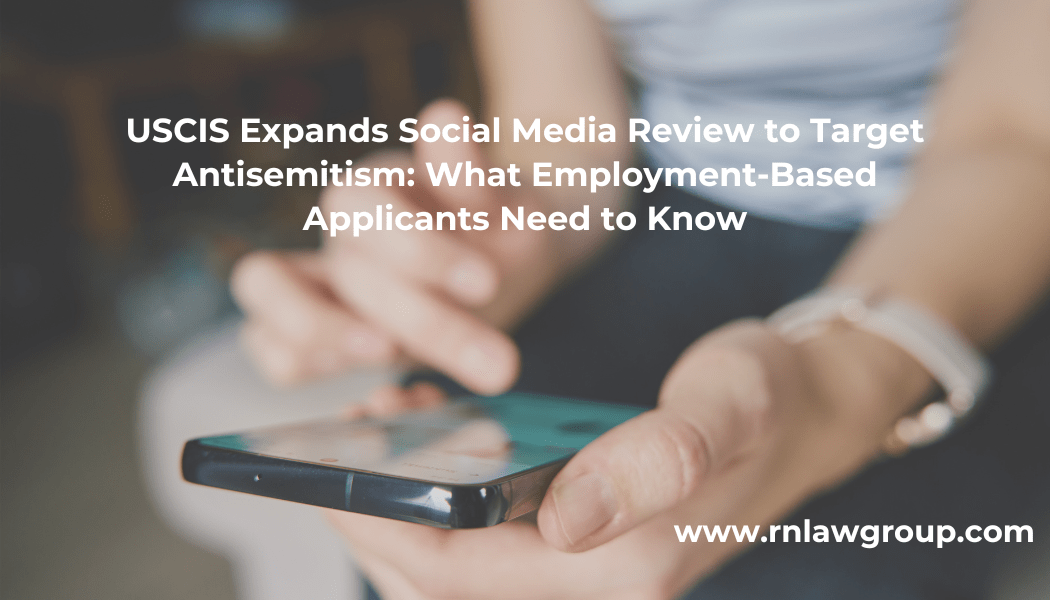
USCIS Expands Social Media Review to Target Antisemitism: What Employment-Based Applicants Need to Know
Since 2019, the U.S. Department of State has required most visa applicants to disclose social media identifiers on forms DS-160 and DS-260. Now, this practice is expanding further. U.S. Citizenship and Immigration Services (USCIS) is beginning to request similar disclosures in benefit applications, signaling a more comprehensive federal approach to digital vetting across all immigration categories. In April 2025, USCIS announced a new policy to screen applicants’ social media accounts for antisemitic content—bringing this scrutiny into sharper focus for employment-based immigrants.
Under this policy, applicants whose online activity is interpreted as promoting antisemitism or extremist ideologies could face visa denials, green card denials, or other immigration consequences—even if the content was posted years ago or shared without malicious intent. While the policy is part of a broader government effort to address antisemitism and violent hate speech, it raises serious questions for employment-based immigrants who may not realize how past online activity can affect their case.
This article outlines the background of the policy, how it will be enforced, implications for high-skilled workers, and how applicants can minimize potential issues during the immigration process.
Policy Background: A National Security Measure With Broad Reach
USCIS’s April 2025 guidance follows broader federal initiatives to combat antisemitism and violent extremism. According to USCIS, the government will now consider social media content when adjudicating benefit applications to determine whether the applicant supports or promotes hate toward Jewish individuals or institutions. While the policy targets support for terrorist organizations, such as Hamas or Hezbollah, it is not limited to violent threats. Any online content that could be interpreted as antisemitic—whether through posts, likes, group affiliations, or shares—may be flagged for further review.
Importantly, this guidance does not apply only to certain visa types. The policy applies across the board, including nonimmigrant categories like F-1, H-1B, L-1, and O-1, as well as permanent residency pathways like EB-1, EB-2, and EB-3. Immigration officers are instructed to evaluate social media content when conducting their discretionary review, particularly in determining moral character or national security risk.
The policy does not provide a concrete definition of antisemitism, leaving room for subjective interpretation. Advocacy groups have expressed concern that without clarity, the policy could be inconsistently applied or misused.
How USCIS and Other Agencies Will Enforce the Policy
Under longstanding procedures, the Department of State already screens social media for most visa applicants. Now, USCIS officers are also expected to evaluate applicants’ online presence during benefit adjudications. This includes:
- Reviewing platforms such as X (formerly Twitter), Facebook, Instagram, YouTube, and LinkedIn
- Analyzing content that expresses support for extremist ideologies
- Flagging comments or shares that insult, threaten, or promote hatred toward Jewish individuals or communities
- Identifying affiliations with online groups that spread hate or misinformation
Even if the content wasn’t created by the applicant, engaging with posts—liking, sharing, or commenting—can raise red flags. Older posts, including those made before arrival in the U.S., may also be reviewed.
USCIS is expected to rely on a combination of manual screening by officers and automated systems that flag accounts based on keywords or associations. The flagged content can prompt officers to delay adjudication, issue a Request for Evidence (RFE), or, in more serious cases, initiate denial or referral for removal proceedings.
Impacts on High-Skilled Workers and Employment-Based Petitions
The policy introduces a new source of risk for high-skilled workers and their employers. These impacts can include:
- Delays in Adjudication: If a post is flagged, officers may refer the case for further security checks or internal review, causing delays.
- Requests for Evidence or Interviews: Applicants may be asked to explain the context of a specific post or prove account ownership. This could happen at USCIS or during a consular visa interview.
- Discretionary Denials: For petitions that involve discretionary elements, such as adjustment of status, a flagged post could lead to a denial based on moral character or national interest concerns.
- Visa Revocation: For those already holding valid visas, consular officers could revoke a visa if concerning activity is discovered during renewal or reentry.
For instance, a software developer with an H-1B visa and an active EB-2 green card petition could see their adjustment case delayed if USCIS discovers they shared or commented on a politically sensitive video years earlier. Even if not antisemitic in intent, content could be misinterpreted in the current political climate.
Employers may also be impacted. If their sponsored employees face delays or denials, project timelines and workforce planning could be disrupted. In industries dependent on international talent, this kind of discretionary policy may affect business operations and employee morale.
Privacy, Due Process, and Civil Liberties
The policy has raised significant civil liberties questions. Legal experts and civil rights groups have pointed out that the lack of a standard definition of antisemitism could lead to misinterpretations or unequal enforcement. Additional concerns include:
- Vague Standards: Without clear criteria, officers may rely on personal judgment, which increases inconsistency and the risk of implicit bias.
- Disparate Impact: Applicants from Muslim-majority or politically active countries may face heightened scrutiny.
- Chilling Effect on Free Expression: Many foreign nationals may delete or avoid expressing political opinions online out of fear, limiting legitimate speech.
- Lack of Transparency: Applicants typically are not informed in advance that a post has been flagged unless it results in a formal RFE or denial.
While U.S. citizens are protected by the First Amendment, immigration applicants do not have equivalent protections. Immigration law allows wide discretion to deny applications based on national security, even when the content in question is constitutionally protected speech.
Practical Guidance: How to Prepare and Protect Your Case
Employment-based immigrants and their legal representatives should consider taking the following proactive steps:
- Review Your Online Presence: Audit all social media profiles for posts, likes, affiliations, or comments that could be interpreted as offensive, extremist, or hateful.
- Ensure Accurate Disclosure: If USCIS requests social media handles, provide them completely and truthfully. Failing to disclose could be considered a misrepresentation.
- Avoid Engagement With Questionable Content: Refrain from liking or reposting inflammatory political content. Even if the intent is ironic or satirical, such posts may be misunderstood.
- Document Context: If there’s any doubt about a past post, prepare an explanation with date, purpose, and audience in case clarification is requested.
- Talk to an Immigration Attorney: If you suspect something in your online history could be flagged, consult an experienced attorney before submitting any USCIS or consular application.
For employers, consider reminding sponsored workers about the importance of maintaining a professional digital footprint. While companies should not interfere with private expression, awareness of the implications is key in today’s environment.
Conclusion
USCIS’s policy to screen for antisemitic content on social media marks a shift toward increased digital scrutiny of immigration applicants, including those in employment-based categories. While the policy is framed as a necessary tool for combating hate and promoting national security, its broad language and subjective standards may result in confusion, delays, and unintended harm to high-skilled immigrants.
Applicants should prepare now by reviewing their social media history and ensuring compliance with USCIS disclosure requirements. Employers and attorneys can play a critical role in helping individuals navigate these new expectations without compromising legal status or future immigration goals.
Reddy Neumann Brown PC located in Houston, Texas, has been serving the business community for over 25 years and is Houston’s largest immigration law firm focused solely on U.S. Employment-based and investor-based immigration. We work with employers, employees and investors helping them navigate the immigration process quickly and cost-effectively.
By: Steven Brown

Steven A. Brown is a Partner at Reddy Neumann Brown PC, where he leads the firm’s Litigation Team, addressing delays and denials of immigration benefits, FOIA requests, and policy and regulatory challenges. Steven is dedicated to delivering practical and effective solutions for clients facing unreasonably delayed or unlawfully withheld immigration benefits, including Employment Authorization Documents (EADs), advance parole, green cards, 221(g) decisions, EB-5 delays, and other immigration-related matters. His litigation efforts were instrumental in Shergill, et al. v. Mayorkas, a landmark case that led to the U.S. government recognizing that under the INA, L-2 and E visa spouses are authorized to work incident to their status, eliminating the need for separate EAD applications. This case has transformed work authorization for thousands of families across the United States.
